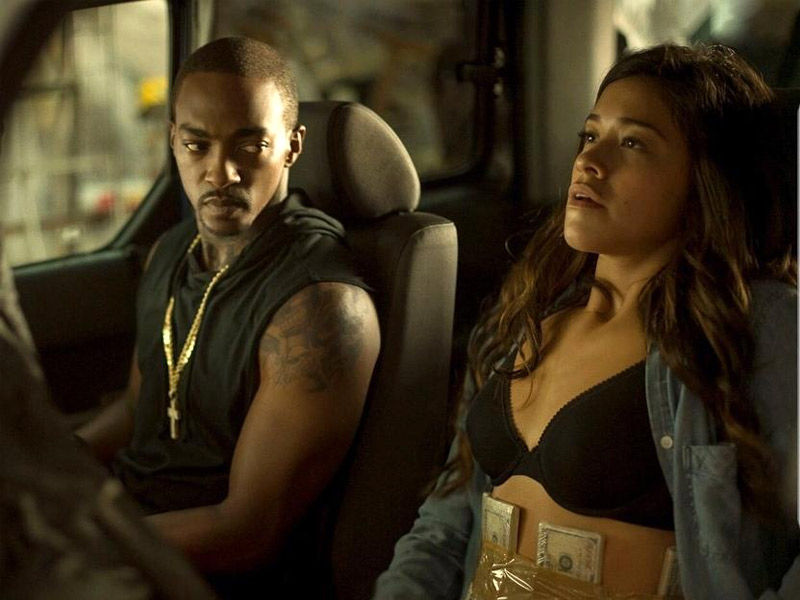“Miss Bala’s” studio version casts Gina Rodriguez as Gloria, an American-born tough, and puts her through many of the same obstacles in order to set up the money shot in which she struts down a driveway brandishing an assault rifle. It’s thrilling to see a confident woman defending herself as all hell breaks loose around her, but it’s a direct contradiction of the original film’s message.
“Miss Bala” is no longer a critique of a system that may allow innocent people to become caught in the crossfire of the drug war, but rather the kickass origin story for a new kind of action film.

Because there is no single definition or interpretation of an empowered woman, female empowerment is a difficult journey for any filmmaker to take. Patty Jenkins answered to James Cameron’s call for “Wonder Woman” to be a “objectified icon” that “I believe women can and should be EVERYTHING, just like male lead characters should be,”.” There is no such thing as a “right” or “wrong” powerful woman.” Jenkins was absolutely correct: Empowerment isn’t about how a woman looks or how strong she is physically; it’s about who she is and who she becomes.
In “Miss Bala,” director Catherine Hardwicke faces a difficult task in portraying that journey while also attempting to make a film about the Latinx community (a historically underrepresented demographic in Hollywood cinema). She’s up for the challenge of remaking the 2011 Mexican film, but she falls short, owing to underdeveloped characters and a few muddled relationships that are mismatched for the messages that screenwriter Gareth Dunnet-Alcocer is attempting to convey.
Taking the premise of the original film, which was about political corruption in Mexico and its connection to beauty pageants, Hardwicke and Dunnet-Alcocer reimagine the story to fit a more Americanized narrative, focusing on Gloria (Gina Rodriguez), a Mexican-born but LA-raised woman. Gloria is a makeup artist who travels to Tijuana to support her friend Suzu (Cristina Rodlo), who is competing in the Miss Baja California pageant.

The ladies go out for the night so Suzu can network with pageant executives; however, when the nightclub is raided and shot up by a Mexican cartel, Gloria manages to flee, but Suzu is nowhere to be found. Gloria quickly discovers the depths of police corruption in Mexico and is kidnapped by cartel leader Lino (Ismael Cruz Córdova, “Mary Queen of Scots”. Gloria sets out on a journey that will change her life forever after her friend goes missing, her life is in danger, and she doesn’t know who to trust.
Also Read, The Royal Treatment: A Cute Dream of Every Girl
While “Miss Bala” deserves praise for having a cast and crew that is more than 95 percent Latinx on a film about Latinos, the majority of the characters are still drug dealers, gang members, and killers. While Dunnet-Alcocer tries to humanise Lino by providing a backstory to explain why he chose the cartel life — like many Latinx in the United States, Lino never feels completely at home on either side of the border — the script neglects to do the same for Gloria. She is defined solely by her relationship with Suzu, with nothing else to draw strength from except the trauma Lino inflicts on her.

Every other character, with the exception of Suzu’s younger brother, is a gang member, a corrupt politician, an abused woman, or someone who has been bought off in some way. Three non-Latinx characters are also immoral and shady in the film, but because these characters aren’t seen for more than a few minutes — whereas we see multiple scenes of Mexicans being awful — it feels like a consolation prize rather than an attempt to level the playing field. In the way the two main characters are connected, there are more mixed messages.
Given that he is Gloria’s captor, the intense sexual tension between Gloria and Lino is quite creepy. One could argue that the tension between Rodriguez and Cruz Córdova stems from their overall attractiveness, but there’s more to it.
Several scenes in Hardwicke’s film intentionally lead the audience to believe that a woman held captive and her abuser have romantic and sexual feelings for each other. This portrayal is very misleading in the era of #MeToo, and the knowledge that comes from listening to survivors of abuse and violence, and raises an ethical question about the ongoing presentation of a lot of violence against women in a film. Audiences can sense the emergence of a charismatic new star in Rodriguez (whose breakout role was in the 2012 Sundance discovery “Filly Brown”).

That dynamic could almost be a complete reversal of the original film, in which a young woman is overwhelmed and effectively destroyed by the corruption she encounters. But, just as audiences now want to see women succeed in a system that is stacked against them, Hollywood craves a happy ending. With a shotgun blast, this mostly English-language version of “Miss Bala” accomplishes what Naranjo did with a sniper round. It may not be an improvement over the original Mexican film, but it will undoubtedly reach a larger audience.





























